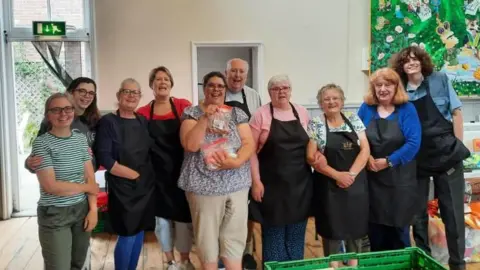In a pressing development, the Silver Road Community Centre in Norwich, Norfolk, has announced that it is forced to turn away people in need due to soaring demand and a lack of funding. The establishment initiated its food bank and community fridge in 2020 as a response to the challenges posed by the COVID-19 pandemic. This initiative was aimed at providing essential support to the local community, particularly to individuals and families facing significant financial constraints that hinder their ability to secure sufficient food.
The food bank at the Silver Road Community Centre is primarily operated by a devoted team of volunteers, underscoring the critical role of community engagement in addressing local needs. However, the financial sustainability of the food bank is heavily reliant on grants and donations. Julie Brociek-Coulton, a Labour councillor on Norfolk County Council who also serves as a volunteer manager for the food bank, expressed concerns about the decreasing availability of grants. She pointed out that the financial landscape has drastically changed, with many funding opportunities being significantly cut back, particularly amid the ongoing cost-of-living crisis.
Over the past five years, Brociek-Coulton has witnessed a noticeable rise in the number of people seeking assistance from the food bank, reflecting a broader trend across the UK. According to the Trussell Trust, a prominent food bank charity, there has been a staggering 51% increase in the distribution of emergency food parcels nationwide during this period. In 2022, the trust reported that it provided 332,540 emergency food parcels across the East of England, compared to just 190,144 in 2019. This statistic highlights the escalating food insecurity challenges faced by many households.
Currently, the Silver Road food bank and community fridge cater to approximately 100 individuals weekly. Brociek-Coulton emphasized the vital role that the facility plays in the local community, describing it as an “essential part.” She noted a shift in the demographic of individuals seeking help, stating that food banks are no longer frequented solely by those on Universal Credit; a broader array of individuals is now utilizing these services, emphasizing the widespread nature of the issue.
Funding challenges are compounded by the ever-increasing operational demands of the food bank. The Silver Road facility predominantly depends on community donations and grants, which the team diligently seeks to apply for. Despite their efforts, Brociek-Coulton revealed that they recently applied for a vital grant that could support their operations for six to seven months but were unsuccessful. This setback is particularly concerning, as the inability to secure necessary funding could result in a significant reduction in the number of individuals the organization can assist monthly. Brociek-Coulton heartbreakingly noted that without this support, they may help approximately 50 fewer people each month.
The volunteers at the Silver Road Community Centre are not only tackling food insecurity but are also striving to foster a sense of community solidarity. Despite the difficulties they face, they remain committed to their mission. Brociek-Coulton concluded by expressing the emotional toll this situation takes on her team, acknowledging the devastation it brings to those who rely on the food bank. She posed a poignant question: “What can we do?” illustrating the deep frustration and helplessness they experience in light of their current challenges.
This scenario at the Silver Road Community Centre reflects a critical and urgent issue that many communities are grappling with as economic pressures continue to mount. With food banks facing unprecedented demand, the call for greater support from local governments, community organizations, and private entities has never been more imperative. The work of food banks like the one at Silver Road is crucial, serving as a lifeline for those struggling with food insecurity, and highlighting the need for sustained financial backing to ensure they can continue their vital services.



